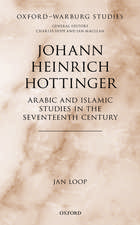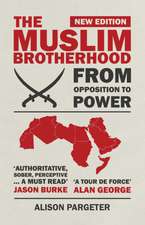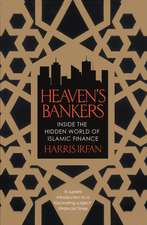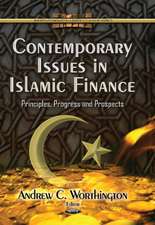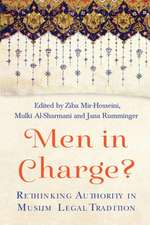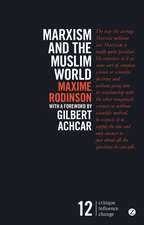The Edge of Islam – Power, Personhood, and Ethnoreligious Boundaries on the Kenya Coast
Autor Janet Mcintoshen Limba Engleză Paperback – 28 iul 2009
Preț: 263.29 lei
Nou
Puncte Express: 395
Preț estimativ în valută:
50.38€ • 52.60$ • 41.70£
50.38€ • 52.60$ • 41.70£
Carte tipărită la comandă
Livrare economică 04-18 aprilie
Preluare comenzi: 021 569.72.76
Specificații
ISBN-13: 9780822345091
ISBN-10: 0822345099
Pagini: 344
Dimensiuni: 156 x 232 x 26 mm
Greutate: 0.43 kg
Editura: MD – Duke University Press
Locul publicării:United States
ISBN-10: 0822345099
Pagini: 344
Dimensiuni: 156 x 232 x 26 mm
Greutate: 0.43 kg
Editura: MD – Duke University Press
Locul publicării:United States
Cuprins
Contents; Acknowledgments; Note on LanguageIntroduction: The Edge of Islam; 1: Origin Stories: The Rise of Ethnic Boundaries on the Coast; 2: Blood Money in Motion: Profit, Personhood, and the Jini Narratives; 3: Toxic Bodies and Intentional Minds: Hegemony and Ideology in Giriama Conversion Experiences; 4: Rethinking Syncretism: Religious Pluralism and Code Choice in a Context of Ethnoreligious Tension; 5: Divination and Madness: The Powers and Dangers of Arabic Epilogue; Notes; Bibliography; Index
Recenzii
The Edge of Islam is a very significant contribution to the anthropology of religion and ethnicity in an area of East Africa that is quite under-represented in the literature, given how enormously important Swahili society is to all of East African, and global, history. The literature on ethnicity is desperate for a work like this. Brad Weiss, author of Street Dreams and Hip Hop Barbershops: Global Fantasy in Urban TanzaniaA fascinating account of the rewards and costs of Muslim identity for a multiethnic African community. The Edge of Islam will be of great use in ethnic studies, linguistic anthropology, Islamic studies, African studies, and religious studies, especially insofar as its insights into ritual performance, personhood, and language challenge top-heavy studies of Muslim reform. With attention to the shifting stakes of modern religious affiliation, Janet McIntosh provides a fresh account of the power of ethnicity and economic inequality to shape religious practice.--Flagg Miller, University of California, Davis"In The Edge of Islam, Janet McIntosh analyses the ethnic and religious tensions between two groups in one coastal Kenyan town, combining a fascinating account of a coastal society with innovative analysis
The result is an exhilarating ethnography, full of details of the social, cultural, and religious practices of the Giriama, which provides important new empirical data and reconfigures our understanding of Islam on the Swahili coast." - Kate Kingsford, African Affairs
"The Edge of Islam is a very significant contribution to the anthropology of religion and ethnicity in an area of East Africa that is quite under-represented in the literature, given how enormously important Swahili society is to all of East African, and global, history. The literature on ethnicity is desperate for a work like this." Brad Weiss, author of Street Dreams and Hip Hop Barbershops: Global Fantasy in Urban Tanzania "A fascinating account of the rewards and costs of Muslim identity for a multiethnic African community. The Edge of Islam will be of great use in ethnic studies, linguistic anthropology, Islamic studies, African studies, and religious studies, especially insofar as its insights into ritual performance, personhood, and language challenge top-heavy studies of Muslim reform. With attention to the shifting stakes of modern religious affiliation, Janet McIntosh provides a fresh account of the power of ethnicity and economic inequality to shape religious practice."--Flagg Miller, University of California, Davis "In The Edge of Islam, Janet McIntosh analyses the ethnic and religious tensions between two groups in one coastal Kenyan town, combining a fascinating account of a coastal society with innovative analysis...The result is an exhilarating ethnography, full of details of the social, cultural, and religious practices of the Giriama, which provides important new empirical data and reconfigures our understanding of Islam on the Swahili coast." - Kate Kingsford, African Affairs
"The Edge of Islam is a very significant contribution to the anthropology of religion and ethnicity in an area of East Africa that is quite under-represented in the literature, given how enormously important Swahili society is to all of East African, and global, history. The literature on ethnicity is desperate for a work like this." Brad Weiss, author of Street Dreams and Hip Hop Barbershops: Global Fantasy in Urban Tanzania "A fascinating account of the rewards and costs of Muslim identity for a multiethnic African community. The Edge of Islam will be of great use in ethnic studies, linguistic anthropology, Islamic studies, African studies, and religious studies, especially insofar as its insights into ritual performance, personhood, and language challenge top-heavy studies of Muslim reform. With attention to the shifting stakes of modern religious affiliation, Janet McIntosh provides a fresh account of the power of ethnicity and economic inequality to shape religious practice."--Flagg Miller, University of California, Davis "In The Edge of Islam, Janet McIntosh analyses the ethnic and religious tensions between two groups in one coastal Kenyan town, combining a fascinating account of a coastal society with innovative analysis...The result is an exhilarating ethnography, full of details of the social, cultural, and religious practices of the Giriama, which provides important new empirical data and reconfigures our understanding of Islam on the Swahili coast." - Kate Kingsford, African Affairs
Notă biografică
Textul de pe ultima copertă
"A fascinating account of the rewards and costs of Muslim identity for a multiethnic African community. "The Edge of Islam" will be of great use in Ethnic Studies, Linguistic Anthropology, Islamic Studies, African Studies, and Religious Studies, especially insofar as it challenges top-heavy studies of Muslim reform with insights into ritual performance, personhood, and language. With attention to the shifting stakes of modern religious affiliation, Janet McIntosh provides a fresh account of the power of ethnicity and economic inequality to shape religious practice."--Flagg Miller, Religious Studies, University of California, Davis
Descriere
Explores ethnoreligious tensions in coastal Kenya




